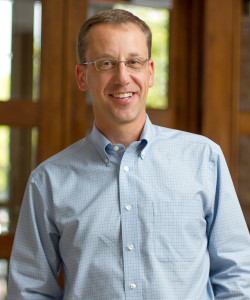 John Ruple (2004) joined the Wallace Stegner Center at the College of Law as our first Research Associate in April 2012. He is currently collaborating with Professor Robert Adler on a book chapter addressing water resources and climate change law and with Professor Lincoln Davies on an empirical analysis of ways to incentivize carbon capture and sequestration. Ruple’s own research involves water resource management, as well as efforts to improve management efficiency and collaborative resource protection between the federal and state governments. He is excited to return to the Stegner Center and to have the opportunity to address pressing public land management issues.
John Ruple (2004) joined the Wallace Stegner Center at the College of Law as our first Research Associate in April 2012. He is currently collaborating with Professor Robert Adler on a book chapter addressing water resources and climate change law and with Professor Lincoln Davies on an empirical analysis of ways to incentivize carbon capture and sequestration. Ruple’s own research involves water resource management, as well as efforts to improve management efficiency and collaborative resource protection between the federal and state governments. He is excited to return to the Stegner Center and to have the opportunity to address pressing public land management issues.
Before joining the Stegner Center, Ruple was a Fellow with the University’s Institute for Clean and Secure Energy, where he worked on land and water issues involving energy development in Utah’s Uintah Basin. He brings practical experience gained through his prior work as a policy analyst in Governor Huntsman’s Public Lands Office, as a consultant specializing in permitting for projects involving ski areas operating on National Forest System lands before attending law school. Ruple also draws upon his previous success litigating water resources, environmental permitting, and regulatory compliance issues.
“We’re very pleased to have John join the Stegner Center as our first Research Associate. John has an extremely diverse background in public lands, natural resources, and water law, and we expect he will greatly strengthen the Stegner Center’s work in these fields,” said Robert Keiter, University Distinguished Professor and Director of the Wallace Stegner Center.
Ruple has published in the Utah Environmental Law Review, Idaho Law Review, and Journal of Energy & Natural Resources Law. He is lead or contributing author on seven technical reports to the U.S. Department of Energy, 15 Environmental Impact Statements or Environmental Assessments, and a book chapter published by the American Chemical Society.
As a student, John was a Dewsnup Fellow and received the Stegner Center’s certificate in environmental and natural resource law. He also holds a Masters of Science degree from Michigan State University (1997) and a Bachelor’s degree from Western Washington University (1992). In his free time he enjoys fly-fishing, skiing, whitewater rafting, and spending time with his two dogs.
